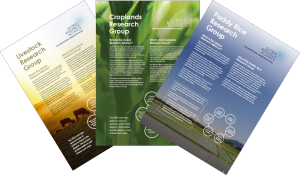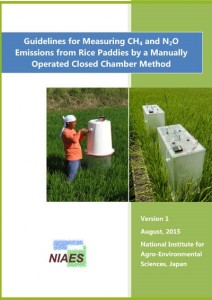In October and November 2018, the Paddy Rice Research Group (PRRG) of the Global Research Alliance (GRA) took part in the APEC-funded project: ‘ Capacity Building on Management Technologies for Climate Smart Rice Cultivation in the South-East Asian and Latin American Rice Sector’.
Paddy rice production is a significant source of methane emissions (CH4), and it is therefore essential that countries find ways to reduce emissions from rice cultivation while improving productivity.
The ‘Capacity Building on Management Technologies for Climate Smart Rice Cultivation in the South-East Asian and Latin American Rice Sector’ project was initiated in 2018 by the Ministry of Agriculture, Forestry, and Fisheries (MAFF), Japan, with the aim of enhancing knowledge among researchers and rice producers of climate change mitigation within the rice sector.
The project was funded by the APEC Agricultural Technical Cooperation Working Group and featured two capability building workshop attended by GRA scientists in partnership with researchers, experts, and rice producers.
The three key aims of the project were:
1) The sharing of knowledge and best practices of new management technologies for adapting to and mitigating climate change in the rice sector;
2) The exchange of views on management technologies and;
3) The development of networks among rice producers, researchers and experts, by organising an international workshop and expert visits.
Two capability building workshops were held; one in Bangkok, Thailand, and one in Parral, Chile. These workshops represented the different production systems found in these two regions and were supported by the Asia and America regional sub-Groups of the Paddy Rice Research Group respectively.
These workshops included expert presentations on a wide range of topics from mitigation through water saving techniques (Alternate Wetting and Drying-AWD) to country-specific experiences, capacity-building training on rice management technologies, and field training.
Following the workshops, farmers expressed an enhanced understanding of the effects of rice cultivation on climate change and the environment, and agreed to share their learning with others in their communities. Farmers and experts agreed on the need for the farming community, governments, and scientists to work together to ensure the right policies are put in place and research projects prioritised to improve climate change mitigation efforts.
Read more:
Read more about the individual presentations, knowledge sharing sessions and field training in APEC’s report: Capacity Building on Management Technologies for Climate Smart Rice Cultivation in the South-East Asian and Latin American Rice Sector.
The Asia sub-group meeting of the Global Research Alliance (GRA) Paddy Rice Research Group (PRRG) will take place in Bangkok, Thailand on the 10-12th of October 2018.
This meeting will take place following the workshop “Rice Landscapes and Climate Change: Options for mitigation in rice-based agroecosystems and the scaling up of climate smart rice cultivation technologies in Asia”. This workshop is an activity of the Paddy Rice Research Group (PRRG) which aims to identify viable options for mitigation and adaptation in rice landscapes and develop scale-up strategies in support of national (NDC) targets.
Organisers of this workshop include the Global Research Alliance of Agricultural Greenhouse Gases (GRA), the Ministry of Agriculture, Forestry and Fisheries of Japan (MAFF) and Asia-Pacific Economic Cooperation (APEC).
Click here for more information about the workshop.
The Institute for Agro-Environmental Sciences (NIAES-NARO) Japan, is pleased to announce the publication of a new handbook entitled Handbook of Monitoring, Reporting, and Verification for a Greenhouse Gas Mitigation Project with Water Management in Irrigated Rice Paddies.
The Handbook was planned as an action plan of PRRG and was cooperatively prepared by its members.
The Special Section ‘Frontline research in mitigating greenhouse gas emissions from paddy fields’, which contains 10 original papers, has been published online by the Soil Science and Plant Nutrition (SSPN), in association with the GRA’s Paddy Rice Group, Partners and Affiliates.
Preface:
Paddy fields are recognized to be a major anthropogenic source of atmospheric methane (CH4), a potent greenhouse gas with a relatively short lifetime in the atmosphere. Like other biogenic sources, CH4 is produced by the activity of CH4-producing archaea, or methanogens, as one of the terminal products in the anaerobic food web in flooded soils. Due to the large amount of CH4 emitted globally from paddy fields, mitigation of emissions from this source is very important in order to stabilize its atmospheric concentration. In addition, because of the possibility of controlling these emissions by agronomic practices, such as management of water, fertilizer, and organic matter, paddy fields appear to be one of the most promising sources for mitigating CH4 emissions.
The mechanisms and factors controlling CH4 production in flooded soils were systematically elucidated almost 50 years ago, mainly by laboratory experiments. Field measurements of the emissions from paddy fields have been conducted at various locations of the world since the early 1980s. Compilation of these data provided the emission and scaling factors for CH4 from rice cultivation in the 2006 IPCC Guidelines for National Greenhouse Gas Inventories. Trade-offs and synergies of mitigating CH4 emissions with N2O emissions or rice production have also been studied. As a result, an array of options that mitigate greenhouse gas emissions from paddy fields has now been proposed and demonstrated by field experiments.
However, there is a strong social need, as the next step of research advancement, to develop implementation strategies for extending the options successfully to local farmers and communities. Because the systems of rice cultivation are widely diverse depending on climate, social, and economic conditions, the options often need to be developed in accordance with those regional conditions. Also, it is necessary to improve the sharing of knowledge of the mitigation options among researchers and other stakeholders, such as policy makers and land users, in different regions of the world. These endeavors are particularly crucial to set up nationally appropriate mitigation actions for rice producing countries, in order to undertake ambitious efforts to combat climate change and meet the 2016 Paris Agreement on Climate Change.
This special section, ‘Frontline research in mitigating greenhouse gas emissions from paddy fields’, has been proposed to address the current research needs. Research papers on the issue were collected through the framework of the Paddy Rice Research Group of the Global Research Alliance on Agricultural Greenhouse Gases (GRA).
The Paddy Rice Research Group’s Sub-America’s division met on 13-15 July this year in Stuttgart, Arkansas, USA. The meeting was attended by 10 GRA Member countries: Argentina, Brazil, Canada, Chile, Colombia, Indonesia, Japan, New Zealand, Uruguay and USA, and a meeting report will soon be available. The presentations for the meeting are now available in the Members’ Area of the website.
Three Research Groups of the GRA, Croplands, Livestock and Paddy Rice, have each produced an easy-to-read overview of their group activities and structure.
Each of the brochures cover the six areas of work that the GRA focuses on: understanding the current research landscape, building capability, good practice guidance and methodologies, research networks and databases, collaborative research, and policy support & links to international initiatives.
- 2016 PRRG Brochure
- 2016 CRG Brochure
- 2017 LRG Brochure (updated March 2017)

More information on each of the Research Groups can be found on the GRA website.
The National Institute for Agro-Environmental Sciences (NIAES) has announced the media release of the new publication, “Guidelines for Measuring Methane (CH4) and Nitrous Oxide (N2O) Emissions from Rice Paddies by a Manually Operated Closed Chamber Method”.
The guidelines are supported by the MIRSA-2 project “Technology development for circulatory food production systems responsive to climate change (Development of mitigation option for greenhouse gas emissions from agricultural lands in Asia)”, and funded by MAFF, Japan, to support the goals and objectives of the Paddy Rice Research Group of the Global Research Alliance.
The GRA Rice Research Group in collaboration with IRRI, CIAT and the CCAC are lanching a project to reduce methane emissions intensities by 30% in eligible systems by 2019, while increasing food security and adaptation capacities of farmers.
The project will produce technical and policy guidance for implementing scalable mitigation options in paddy rice in Southeast Asia, South Asia, and Latin America. For more information see here.
Summary Reports from the fifth meetings of the Croplands Research Group and the Paddy Rice Research Group are now available for you to download and read.
The Croplands Research Group met for the fifth time on 7 November in Tampa, Florida, USA alongside the ASA-CSSA-SSSA “Tri Societies” annual meeting. The meeting was attended by 21 Alliance member countries, Alliance Partners and other invited speakers. The short summary version of the 2013 meeting report is now available from the Croplands Research Group page.
The Paddy Rice Research Group held their fifth meeting in Bogor, Indonesia on 25 October alongside the ESAFS11 and was attended by representatives from 6 Alliance member countries, other invited experts and Alliance Partners. To read the summary report for this meeting visit the Paddy Rice Research Group page.
Both these Research Groups have agreed to meet again in the second half of 2014 for their sixth Group meetings.
The first issue of the Paddy Rice Research Group e-News has been released. Download it here: PRRG_e-News_130402.
The newsletter will be sent out to the contact points of member countries and partners and is planned to be issued once every three months or so. The e-News will be a good tool for communicating with eachother. Please transfer and circulate it to anyone whom you know to be interested in the activities of GRA-PRRG.
If you have any useful information that is relevant to the GRA-PRRG, such as events, meetings, publications and others, please send to Kaz Yagi at [email protected].
For more information on the Paddy Rice Research Group and its activities see the Paddy Rice Research Group page.

